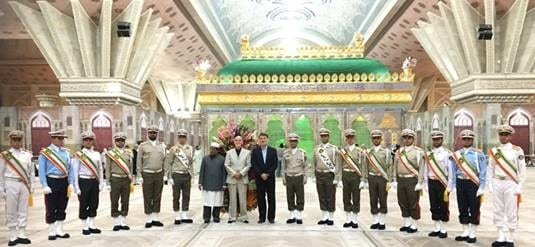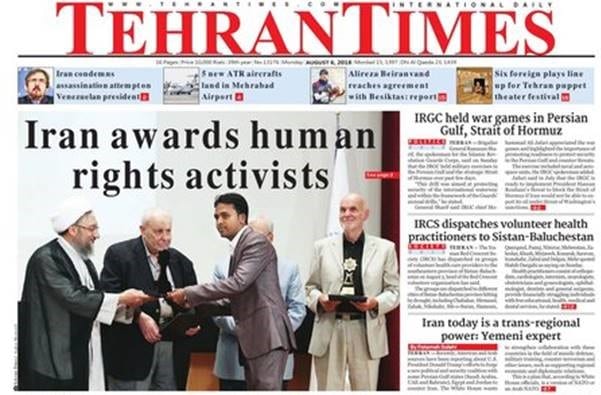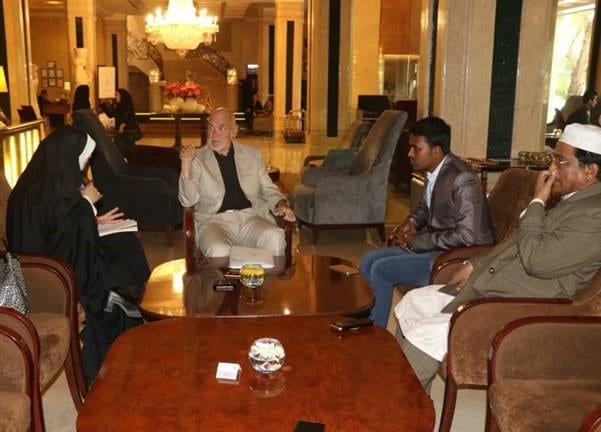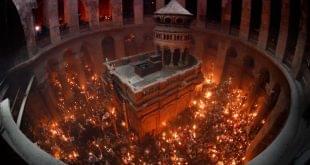TEHRAN, Aug. 08 (MNA) – Norwegian physician and human rights activist Trond Ali Linstad says his time around Palestinians as a volunteer doctor at refugee camps helped open his eyes to the other side of the story: the side of the oppressed.

The International Islamic Human Rights Award in Iran honored its winners on August 5, 2018 in Teheran.
The Award is given by Iran High Council for Human Rights to the Islamic human rights defenders who support and promote Muslim rights in innovative ways, regardless of their religions or beliefs.
The Award is also granted to those Muslims whose rights are violated by the host countries.
This year, the Award went to the former Grand Mufti of al-Quds (Jerusalem), Sheikh Ekrima Sa’id Sabri, human rights activist and principal of a Bangladeshi school for Rohingya children, Rokonuzzaman Ansari, and Norwegian physician and human rights activist Trond Ali Linstad.
Also watch The Herland Report TV with Dr. Linstad here and here.

Visiting Mehr News Headquarters, Linstad, a 75-year-old physician who converted to Islam during the 1980s and has dedicated his life to promoting Muslim rights around the world ever since, said the greatest appeal of Islam to him was the religion’s strong call to humanitarian work. Linstad began his career as a regular doctor in Oslo, and went on to offer his medical services.
The following is his interview with Mehr News:
You have been awarded the International Islamic Human Rights Award for your contributions to defending Muslims’ rights. What inspired you to dedicate your time and effort to this cause?
I come from Norway. I became a Muslim many years ago after I studied Islam and saw that the religion invites you to do humanitarian work. That call served as a great inspiration to me to dedicate my time to doing humanitarian work.
- Also read: NYTT Herland Report TV program med Dr. Trond Ali Linstad: Hvorfor demoniseres både kristne og muslimer?
- Intervju Trond Ali Linstad: Jesus er et stort forbilde som vi bør følge – Herland Report.
 You were one the first in Norway to convert to Islam – a country where Islam is a minority, with Muslims making up roughly 6% of the population. What about the religion appealed to you the most?
You were one the first in Norway to convert to Islam – a country where Islam is a minority, with Muslims making up roughly 6% of the population. What about the religion appealed to you the most?
Well, I’m a medical doctor. I worked and stayed for a long time at the Palestinian refugee camps when I was a young man. Surrounding myself in that environment, where all my patients and all my colleagues were all Muslims, allowed me the opportunity to take part in discussions about existential questions and religions, and within this process, I decided to become a Muslim.
I should say that I also visited Iran at that time – I got this great inspiration from Iran just after the Islamic Revolution.
So Islam in general, Iran and more specifically the Palestinian cause, were all the inspiration I needed to become a Muslim. With being a Muslim, comes the notion of humanitarian work, which is implied in Islam. So, that’s the direction I decided to take after my conversion.
You have a strong, and at times, leading presence in various Palestinian institutions in Norway. What piqued your interest in the Palestinian issue, in particular?
I obtained a diploma in tropical medicine and hygiene in Liverpool. I wanted to add an international aspect to my work, and at that time there were some great disturbances in the world, as there are today.
 At that time, it was the US bombing Vietnam, as well as many other instances of aggression carried out by US in various parts of the world.
At that time, it was the US bombing Vietnam, as well as many other instances of aggression carried out by US in various parts of the world.
And one place that seemed to be rife with American-Zionist aggression was of course Palestine. So with this background, I focused my activities on the Palestinian issue and I became a doctor to work at many Palestinian camps.
One of your major contributions to the Muslim community was the establishment of the Islamic foundation Urtehagen in Norway. What motivated you to become so active in promoting Islam in your country?
First, keep in mind that most of the population in Norway is either Christian or secular. The Muslim community in Norway is a minority, around 100,000 Muslims. After I converted to Islam, I came back to my country and made my mind.
I stressed that we also need to give a face to Islam in this country, so as to make people respect and start to understand what Islam is. And I thought we should establish an Islamic institution, engage in humanitarian and social work with the non-Muslim Norwegian society, but also to work with the Muslims to promote their rights and make them conscious and proud of their religion.









